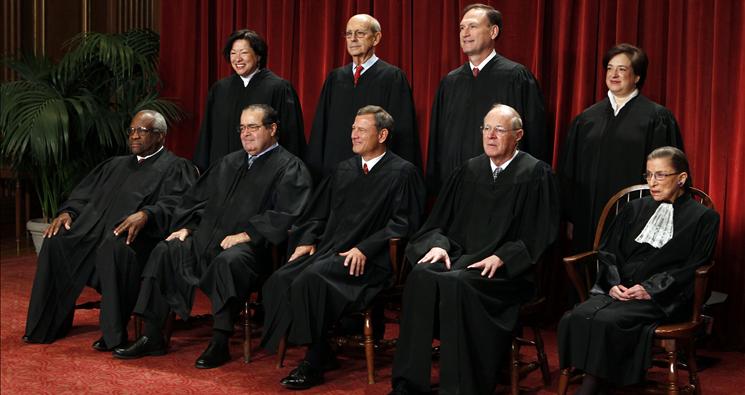Supreme Court Rewrites ObamaCare, Allows Huge Tax Increases
The Supreme Court’s 5-to-4 decision upholding ObamaCare stunned me as it did others. What surprised me the most is that the majority rewrote the law in order to uphold it.
To validate ObamaCare, the majority first had to uphold the constitutionality of the individual mandate. The individual mandate, which is the essential component of ObamaCare, requires virtually all Americans to purchase health insurance or pay annual penalties. The majority upheld the individual mandate by deciding it was a tax, not a regulatory penalty. Congress has broad authority under its taxing power.
The taxing power argument, however, was the government’s secondary argument to support the individual mandate. The government’s primary argument was that the individual mandate was justified by Congress’s power under the Commerce Clause, an argument that a combination of five other Justices had rejected. Thus, since the government’s main argument was rejected, the majority had to rely on the government’s secondary taxing power argument to uphold ObamaCare.
The government's taxing power argument had been a loser in the lower federal courts. That is why it was surprising that the majority accepted it. Prior to the Supreme Court’s decision, no federal court to reach the merits had accepted the government’s taxing power argument.
The reason these other judges rejected the tax argument is because, to accept it, a court would have to rewrite the individual mandate into something different from what Congress had drafted and passed.
In drafting and passing the individual mandate, Congress took the following steps to make it clear that the requirement to pay money to the government for failing to obtain health insurance was a penalty designed to force people into the insurance market, not a tax intended to raise revenue for the government:
- An earlier version of the health care law labeled the individual mandate’s monetary exaction as a “tax,” but in the final version of the health care law, which Congress passed, Congress removed the term “tax” and replaced it with the term “penalty.” Penalties are legally distinct from taxes. Penalties compel or punish behavior. Taxes raise revenue to support the government;
- In its factual findings supporting the final version of the individual mandate, Congress specifically relied only on its Commerce Clause powers, not its taxing powers;
- Congress knew what it was doing when it called the individual mandate a penalty and not a tax. Congress knows the difference between penalties and taxes. In ObamaCare, Congress specifically called other assessments of money “taxes,” for example, the taxes on indoor tanning services and medical devices, because Congress intended those provisions to raise revenue, unlike the individual mandate;
- Congress eliminated traditional IRS enforcement methods (such as criminal penalties, liens, and levies) for failure to pay the individual mandate penalty, again underscoring that Congress did not consider the penalty to be a tax; if Congress had, it would have included those enforcement methods; and
- Congress listed seventeen revenue-generating provisions in ObamaCare. In that list, Congress did not include the individual mandate, obviously because Congress did not consider the individual mandate something that would raise revenue for the government as would a tax.
As discussed, a combination of five Justices rejected the government’s main argument that the Commerce Clause authorized the individual mandate. That was a correct conclusion. If five Justices had accepted that argument, Congress would have been authorized to use its Commerce Clause power whenever it wanted to force Americans to buy products favored by Congress. The rejection of the Commerce Clause argument should have been the end of the case and the end of ObamaCare. But it was not. Rather, the majority rewrote the individual mandate to say that it was a tax, ignoring how Congress had drafted the law, to uphold all of ObamaCare.
The majority’s rewriting of the individual mandate as a tax did not escape the attention of the four dissenting Justices. Those four Justices had determined that the entire ObamaCare law should be invalidated. They correctly explained that “to say that the Individual Mandate merely imposes a tax is not to interpret the statute but to rewrite it. . . . [The majority] today decide[d] to save a statute Congress did not write.”
By upholding ObamaCare, the majority has allowed one of the biggest tax increases in American history to stand. ObamaCare includes twenty new or higher taxes on families and small businesses. This tax increase will take place despite the fact that President Obama pledged that he would not raise taxes on any American making less than $250,000, which is most Americans, and assured Americans that the individual mandate was not a tax.
Although ObamaCare is now the law of the land, it can still be repealed. To achieve that end, it is up to the American people. The majority of Americans continue to oppose ObamaCare and want its repeal. It is up to that majority to effectuate their will at the ballot box this November and to continue to apply political pressure to ensure that their elected officials do what they were elected to do: repeal ObamaCare.
